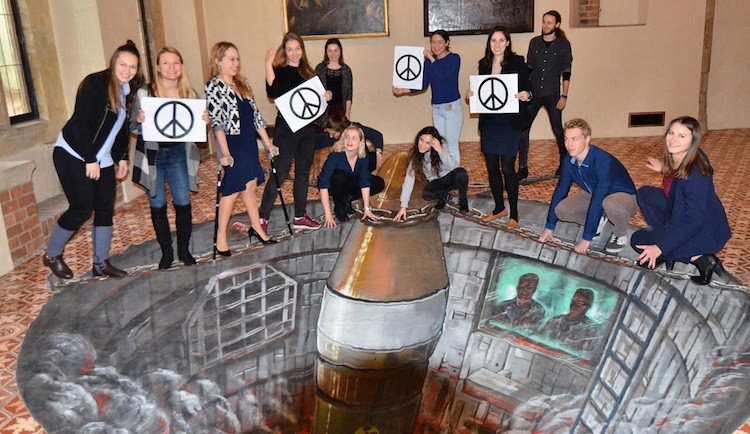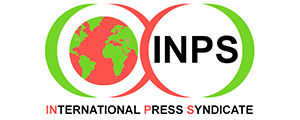
By Jamshed Baruah
GENEVA (IDN | UNFOLD ZERO) – Amid menacing tensions between the United States and North Korea in the aftermath of Pyongyang testing a long-range missile that is potentially capable of hitting the entire mainland U.S., young academics and activists from around the world are asking world leaders to reduce the risks of nuclear weapons being deployed and to support United Nations initiatives for nuclear disarmament, including the High-Level Conference on Nuclear Disarmament to take place in 2018.
The appeal – Reach High for a Nuclear-Weapons-Free World – was issued at the conclusion of a three-day conference (November 27-29) in Prague, the capital city of the Czech Republic. It was organised by the Youth Network of Abolition 2000, a global civil society network to eliminate nuclear weapons.
The conference included participants from Austria, Belgium, Canada, Chile, Czech Republic, France, Germany, Italy, Japan, Kazakhstan, New Zealand, Portugal, Russia, Switzerland, United Arab Emirates, United Kingdom and the United States.
“Any use of nuclear weapons regardless of which country uses them, would cause catastrophic health, economic and environmental consequences that would last for generations,” said Marzhan Nurzhan, Convener of the Youth Network and a citizen of Kazakhstan which suffered under the impact of Soviet nuclear tests during the Cold War.
“Young people have a vested interest in the future and should be included in the deliberations, negotiations and campaigns to prevent nuclear war and achieve nuclear disarmament. We can work alongside and in partnership with our seniors, who have expertise and experience. Such inter-generational cooperation is essential to ensure success.“
The appeal urges the nuclear-armed States – including the United States and North Korea – to pledge never to be the first to use nuclear weapons, as well as to ensure that all nuclear weapons systems are taken off high-readiness, and to commit to negotiate a phased out nuclear disarmament.
“The escalating threat of nuclear confrontation between North Korea and the USA is frightening,” said Alyn Ware, Global Coordinator of Parliamentarians for Nuclear Nonproliferation and Disarmament (PNND), a co-sponsor of the conference.
“But calling on North Korea to unilaterally give up its nuclear weapons while they are threatened with nuclear attack or pre-emptive strike from other countries, is unrealistic,” added Ware.
“A no-first-use pledge by all nuclear-armed States, and the establishment of a regional nuclear-weapon-free zone, have much more chance of success. These proposals already have considerable support from parliamentarians in all three key countries – Japan, South Korea and North Korea,” added Ware.
The appeal emerging from the Prague conference calls on all governments to attend the 2018 UN High-Level Conference on Nuclear Disarmament at the highest level (Prime Minister, President, Foreign Minister or Minister for Disarmament), in order to be able to make concrete progress on nuclear-risk reduction and disarmament.
The appeal also asks non-nuclear countries to sign the UN Treaty on the Prohibition of Nuclear Weapons, adopted in July 2017, which provides for a complete prohibition of nuclear weapons by those countries that sign. 53 countries have so far signed the Treaty. The appeal puts forward the objective of 100 countries signing by the end of the High-Level Conference.
Move $100 billion away from the nuclear arms budget
The Prague appeal also calls for the $100 billion nuclear weapons budget (most of which is spent on the U.S. nuclear arsenal) to be slashed, and instead allocate the funds to climate protection, implementing the sustainable development goals, and for other social and economic needs.
“High nuclear weapons budgets have created a self-perpetuating cycle, where the corporations manufacturing the weapons have a vested interested in maintaining the nuclear-arms race, and workers in the nuclear weapons factories have an interest in keeping their jobs,” said Bethan Edwards, PNND researcher and conference speaker.
“In order to revert to a peace economy, we must encourage nuclear weapons corporations to convert to alternative production, and we must end public and private investments in these corporations until they do so,” added Edwards.
“Already, at least four governments – including Lichtenstein, New Zealand, Norway and Switzerland – have adopted policies against investments in nuclear weapons corporations,” said Calvin Konig, researcher for the Basel Peace Office, another co-sponsor of the conference. “The adoption of the Treaty on the Prohibition of Nuclear Weapons provides an opportunity for us to convince more countries to do so.”
The appeal recognizes that a large number of countries still rely on nuclear deterrence as part of their security doctrine, but affirms that these countries are legally obliged to achieve nuclear disarmament. “We call on nuclear-reliant countries to fulfill that obligation, while maintaining their security, by replacing nuclear deterrence with common security approaches and international law,” said Kristýna Chyňavová, a law student at Charles University in Prague and a participant in the conference.
“The UN Charter provides for effective approaches to achieving security through diplomacy, negotiation, mediation, arbitration, adjudication, use of regional mechanism and use of the UN Security Council and General Assembly. Even in these turbulent times It is possible to replace to law of force with the force of law.“
“The Hibakusha (survivors of the Hiroshima and Nagasaki nuclear bombings) have been appealing for the abolition of nuclear weapons in their lifetime,” said Kanau Kobayashi a Japanese university student who helped organize the conference.
“This inter-generational campaign, of youth working with Hibakusha and other elders for nuclear abolition, has the possibility to succeed, especially if world leaders and civil society take seriously the opportunity provide by the UN High-Level Conference next year,” he added. [IDN-InDepthNews – 04 December 2017]
Photo: Participants in the conference ‘prevent’ a nuclear missile from being launched from Charles University in Prague. Credit: UNFOLD ZERO
IDN is the flagship agency of the International Press Syndicate.
Facebook.com/IDN.GoingDeeper – twitter.com/InDepthNews

